Photographer: Paige Peterson
Writer: Larry Erickson
“To serve and protect” is more than a common police motto. It’s a solemn commitment among the ranks of Des Moines police officers. That’s why they choose this career. “You want to serve and protect your community,” says Maj. Todd Dykstra, a 26-year veteran on the force.
That’s the nature of the profession, adds Lt. Lillie Sams. “I know I’m not going to save the world, but I want to be in a position to help someone.”
And yet, nationwide, events in recent years have strained relations between police departments and the communities they’re sworn to serve. Officers die in fulfilling that commitment—140 in 2016, including five from Greater Des Moines.
Across the country, criticism of police has grown following incidents in which citizens have been shot or mistreated. In Des Moines, strong community relations remain a priority of the department’s leadership, encouraging officers to be involved in neighborhood events and schools and maintaining outreach programs to diverse groups.
The public’s support was evident in the outpouring of grief and encouragement after the deaths of three officers in traffic accidents last year and the shootings of two patrolmen as they watched over their communities by night.
These tragedies gave rise to the Guardian Project, a campaign dedicated to raising funds for video body cameras and other gear. Working with the ad agency Flynn Wright, photographer and dsm contributor Paige Peterson created portraits of police officers, a gallery of faces and figures who embody the commitment to service.
In this story, dsm presents some of Peterson’s work, focusing on a few of the men and women whose goals include ensuring peace and safety. They represent their department, not as an institution but as an alliance of honor and good will.
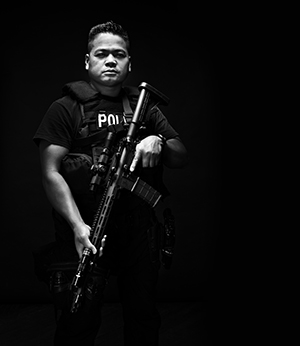
In Harm’s Way
Serving on a SWAT team is deadly serious business. Yet from his earliest days with the department, Senior Police Officer Sone Cam says, “I knew that’s what I wanted to do.”
In Greater Des Moines, this joint force is called the Metro STAR Unit (Special Tactics and Response). Cam’s role is “entry team coordinator.” They’re the guys in military-style gear who may be called in to clear the way on raids, rescues or other situations where, he says, “something bad has happened.”
Adrenaline? “It’s definitely a rush,” says Cam, 44. It’s safest for everyone when standoffs can be ended without violence, of course. But one way or another, Metro STAR’s job is to end them. As Cam sees it, “we’re the game-ender.”
Despite the group’s intimidating appearance, dangerous duties and stealthy operations, “we have good support from our community,” Cam says, recalling neighbors breaking into applause after Metro STAR resolved one tense situation.

Powerful Tool
As a counselor at a domestic violence shelter, Lillie Sams heard plenty of stories about police, “not all of them favorable,” she says.
But her own interactions with officers led her to police work and new applications for her sociology degree from the University of Iowa and master’s degree from Drake.
“I know I’m not going to save the world, but I want to be in a position to help someone,” the police lieutenant says from her desk as an assistant watch commander.
People are sometimes surprised to learn that communication and general interpersonal skills are important parts of police work. “It isn’t all about arrests,” she says. And in 17 years on the force, she can recall being involved in only two physical altercations.
The gear she carries may include a Taser and a handgun but, she says, “my most powerful tool is my ability to communicate.”
Explaining her career change, at age 33, to her parents was a test of that ability. They grew up in Alabama in a different time and place for an African-American family. Sams was the department’s first officer of her gender and race, and her mother couldn’t imagine it, protesting, “We’re not what police look like!” Times have changed, and, Sams says, “Change is good.”
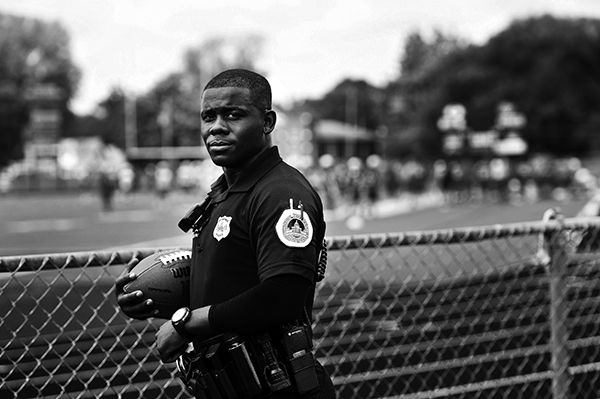
Team Player
Patrol Officer Marco Finley once dreamed of life on an NFL team. He’s on a better team now, he says. “As a kid, I wanted to be a cop,” then came football—wide receiver at Missouri State, dreaming big. Responsibilities as a young father pulled him back to his criminology studies and his original dream.
“My goal was to help people,” he says, starting with his four younger siblings and an older sister. “I wanted to be a positive role model for those guys.”
Finley works the first shift, overnight hours where officers must be at the top of their game. “That’s what I love,” he says. Football trained him for this, he adds, citing the strategic aspects, leadership and teamwork of the department.
He still dreams of the future and imagines becoming a school resource officer, mentoring kids like his siblings. “I want to be on a first-name basis with students and their parents,” he says.
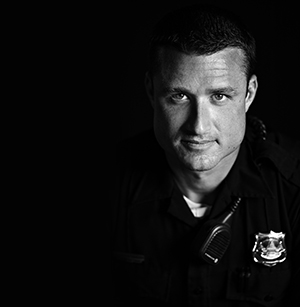
Looking Forward
Senior Patrol Officer Andy Long works the east side of Des Moines as part of the “third watch patrol,” which covers the city from 1 p.m. to 11 p.m. Seven years in, at age 32, he is where he belongs, he says. It took time.
With a history degree, Long spent three years in sales in the Chicago area, but, he says, that profession “wasn’t for me.”
Police work offers more variety and more satisfaction, he says: “It calls on critical thinking and communication skills; there’s even some salesmanship involved sometimes.”
And Long appreciates the department’s focus on community engagement. “Our leaders do a good job of getting us involved,” he says. He enjoys helping with some youth programs that seek to re-direct first-time offenders: “Our interaction with youth is key in creating the kind of community we’ll serve in the future.”
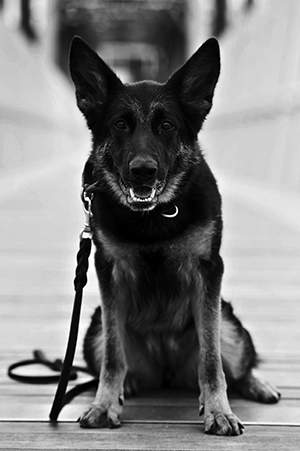
Rookie With No Uniform
In keeping with the Police Department’s diversity goals, the canine unit added its first female dog last year. Nala, a German Shepherd, was 2 years old when she joined the force. The canine unit, created with three dogs in 2000, now has five; the program is funded by seized drug money.
These dogs and their human partners have valuable, specialized roles, says Lt. Chris Scott. They track missing persons and criminal suspects, and search for drugs, explosives and other criminal evidence. And if needed, they can be instrumental in apprehending suspects who would rather not fight an aggressive opponent with large teeth and powerful jaws.
With her partner, Officer Aaron Cawthorn, Nala earned an award as top rookie in a regional police-dog competition last summer. Of course, you won’t hear that from her; Nala is not one to brag. She just enjoys doing her job well, Lt. Scott says.

‘A Great Career’
“My goal was to be the best cop I could be,” Maj. Todd Dykstra says. At 51, he’s reflective when considering his 26 years on the force: “It’s been a great career.”
“It’s not for everyone,” he adds. “You want to serve and protect your community. If you can do that and support your family—what a great combination.”
Raised on a southeast Iowa farm, Dykstra was working at a QuikTrip store in Ames—he earned a teaching degree at Iowa State University—and he would chat with officers who stopped in for coffee. One suggested he consider police work. That’s all it took.
Now he’s the one suggesting police careers. “We try to recruit individuals we think would make good police officers,” he says. Senior officers want to be sure they leave their city in good hands.
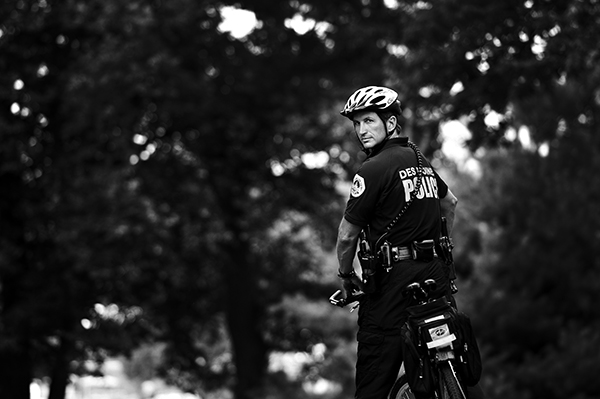
Straight Shooter
Sgt. Paul Parizek didn’t set out to be the department’s public information officer, its face on television explaining tragic and complex events to the media and the public.
“I was a street cop,” he says, one who was mentored along the way by current Police Chief Dana Wingert, who selected him for this role. Parizek, 48, says Wingert may have recognized “a guy with a gift for gab.”
It’s much more than that, of course. Parizek handles the department’s social media and requests for information. One audience he always keeps in mind is his fellow officers. “I’m representing them,” he explains. He strives to be direct, factual and never evasive in responding to media questions.
Parizek has been a cop since 2005, getting his start in Madrid, Iowa, and eventually working with a gang-crime unit in Des Moines until starting his current assignment in 2015.
One principle guides his very public and highly scrutinized role: “Just tell it like it is.”








